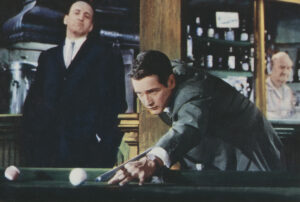Barely 24 hours after an armed man was found within several hundred yards of Donald Trump on his golf course in Florida, my local newspaper ran a piece with the following headline: “Would-be assassin soured on Trump: Who did he want as presidential and VP candidates?”
Great question. What, for that matter, did the wannabe killer, Ryan Routh think of the impending match-up on Monday Night Football? What were his thoughts on electric vehicles, school choice, weight loss drugs and parenting?
More prestigious outlets hardly showed more attachment to what remains of proper American journalism. The New York Times seemed more caught up in proudly displaying the fact that it had interviewed Routh a year earlier about his experiences trying to recruit fighters in Ukraine. By the time darkness had fallen, on the very day Trump was, maybe, almost killed, you had to make your way through the coverage of the Emmy Awards, to find any mention of the assassination attempt.
By mid-week, focus had shifted from the man on the golf course to who was to blame for America’s political violence, or in this case near-violence. Trump and his supporters, relieved to change the subject from their canard about pet-devouring immigrants, blamed the Other Side for super-charged rhetoric demonising Trump as an existential threat to democracy. The Democrats, for their part, were themselves relieved to turn off the short-lived spigot of crocodile tears over the violence. Instead, they blamed the former president and his supporters for bringing assassins upon themselves with their own super-charged rhetoric. Both sides’ arguments were accurate, as far as it goes. But in a saner society, such arguments, on both sides, would have been grotesquely beside the point.
Ever bored and restless, the conversation about what seemed to be an attempt to assassinate Trump evolved yet further. In baseball, a pitcher will sometimes hit a batter intentionally, or pretend to. When the opposing team takes the field in turn, their pitcher will then hit an opposing batter in retaliation, with the spectators holding their breath in anticipation. And sure enough, here was Elon Musk, real-life Chauncey Gardiner, and a moral imbecile of world-historical dimensions, tweeting out shortly after the incident at the golf course: “And no one is even trying to assassinate Biden/Kamala”. At present, whatever happened to Trump on Sunday now straddles the spheres of politics, culture, sports and entertainment in general. It has been spread so thin over the national atmosphere that no one I know, on various levels of society, is even talking about it.
So much has been written about how our commercialised and commodifying societies have assimilated and normalised mores that used to épater les bourgeois. The combined transgressiveness of Kafka, Celine, Mann, Gide, Lawrence, Henry Miller and Genet do not even approach the transgressiveness of teachers, doctors and politicians enabling children who, in the perplexity of innocence, wish to swap out their genitals for those of the opposite sex. In America, if it makes a profit, or anyway if it virtuously conceals the lust for material profit, it is allowed.
The rate at which political violence, in deed or word, has been comfortably taken in stride would, at another historical moment, have been shocking. From the moment Trump was elected in 2016, violent rhetoric and acts on both sides gradually moved from controversy, to social media fodder, to simple background noise. Comedian Kathy Griffin holding a mock-up of Trump’s severed bloody head resulted in outrage, official investigations and sold-out gigs wherever she went. After publicly saying he’d like to “punch Donald Trump in the face,” Robert De Niro declared “Fuck Trump” at the 2018 Tony Awards. Meanwhile, in 2017, Trump appeared to be defending the white supremacist demonstrators in Charlottesville as, at least, not neo-Nazis.
But then, way back in 2004, Nicholson Baker published a novel musing about the possibility of assassinating George W. Bush. But then, De Niro himself had starred in Taxi Driver, in which the violence of a murderous vigilante is, by the end of the movie, depicted as morally superior to the sanctimonious soul-murders committed by an average America politician. By the time Will Smith bitch-slapped Chris Rock on stage at the Oscar ceremony, in 2022, you had to ask yourself whether the actor was simply bringing decades of Hollywood values to their logical conclusion, or whether he was acting under the influence of American politics; which is influenced by American popular culture; which is influenced by American politics. The tortuous complexity of American life really makes you wish you could find who was responsible for the whole mess and punch them right in the nose.
As anything goes in culture, people become numb to the lack of inhibition around them. Say what you will about the maddening dispensations that sometimes have resulted from the popularisation of trauma psychology, but there is now a collective emotional numbness that is one of the salient symptoms of trauma. On the one hand, anything goes. On the other hand, no one protests that anything goes. Which opens the door to more erstwhile prohibited behaviour. Which causes more emotional numbness. And on and on.
And the bitter irony is that the so-called “political violence” being mechanically bemoaned by both sides is as nothing compared with the violence tearing civil society apart. It is almost obscene to express outrage over political violence when America suffers more mass shootings, and more school shootings, than any country on earth. In such a situation, political violence surely is an inevitability.
Yet the term “political violence” is probably a mischaracterisation of the two assassination attempts, though Routh never actually made an attempt. Routh is clearly a profoundly troubled man. From what is known, so too was Thomas Matthew Crooks, who fired at Trump during the latter’s Pennsylvania rally. Neither has had a coherent ideological motive attributed to him. Ideology matters. If Archduke Franz Ferdinand had been assassinated by some insane Austrian and not a politically motivated Serb, the First World War might never have happened. Modern America, then, is not suffering from political violence. Rather, America is suffering violence that is occurring in the political realm, violence committed by members of the country’s increasing legions of people disconnected from reality. Politics is, by definition, an arena of pathological egotism and self-love. It only follows that madness is to politics what flies are to the dregs of human intestines.
Decades ago, I was taken by a Spanish friend to a dark restaurant in Madrid that served only two dishes, one type of fish and and one type of steak, and where two waiters stood a polite distance from the table the entire night. My friend had brought another man, whom he did not introduce. Not long into the meal, this second man laid a paper napkin in front of him and took a pen from his pocket. He diagrammed, with painstaking precision, noting the position of the car and the position of the explosive devices, and the route that Carrera Blanco, Franco’s successor, had taken that fateful day Basque terrorists blew him out of his car, thus saving Spain for democracy. Then he suspended the napkin over an ashtray, held a lighter under it, and dropped the shriveling flames into oblivion.
The Basques who assassinated Blanco had not cared a whit about democracy in Spain; they cared about their cause. But when I think of political assassinations, I think of that sort of planning, and of a commitment that is both ideological and personal. I also think of the fine and noble figures assassinated in America during the Sixties. Here is another brute fact: Trump may be a pathological liar, but the straight shooters are all on the Right. If Pennsylvania and the golf course prove anything, along with Elon Musk, it’s that Trump has less and less to fear from what now passes in America for political violence.
Disclaimer
Some of the posts we share are controversial and we do not necessarily agree with them in the whole extend. Sometimes we agree with the content or part of it but we do not agree with the narration or language. Nevertheless we find them somehow interesting, valuable and/or informative or we share them, because we strongly believe in freedom of speech, free press and journalism. We strongly encourage you to have a critical approach to all the content, do your own research and analysis to build your own opinion.
We would be glad to have your feedback.
Source: UnHerd Read the original article here: https://unherd.com/



